|
|
|
Sort Order |
|
|
|
Items / Page
|
|
|
|
|
|
|
| Srl | Item |
| 1 |
ID:
134356
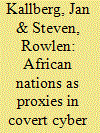

|
|
|
|
|
| Summary/Abstract |
The growth of the African Internet, and services related to the Internet, has been rapid over the last decade. Following this market expansion, a variety of service providers have started to provide access. A fast-growing market puts pressure on the providers to deliver services first and only then seek to secure the networks. Over time, industrialised nations have become more able to detect and trace cyber attacks against their networks. These tracking features are constantly developing and the precision in determining the origin of an attack is increasing. A state-sponsored cyber attacker, such as intelligence agencies and electronic warfare units, will seek to avoid detection, especially when the attacks are politically sensitive intelligence-gathering and intrusion forays into foreign states' networks. One way for the attacker to create a path that links the attacks and the originating country is by actions through a proxy. The less technologically mature developing nations offer an opportunity for cyber aggression due to their lower level of security under the quick expansion of the Internet-based market. Developing countries could be used as proxies, without their knowledge and consent, through the unauthorised usage of these countries' information systems in an attempt to attack a third country by a state-sponsored offensive cyber operation. If the purpose of the cyber attack is to destabilise a targeted society and the attack succeeds, the used proxies are likely to face consequences in their relations with foreign countries, even if the proxy was unaware of the covert activity.
|
|
|
|
|
|
|
|
|
|
|
|
|
|
|
|
| 2 |
ID:
131521


|
|
|
|
|
| Publication |
2014.
|
| Summary/Abstract |
This article revisits the official culture of the early khedivate through a microhistory of the first modern Egyptian theater in Arabic. Based on archival research, it aims at a recalibration of recent scholarship by showing khedivial culture as a complex framework of competing patriotisms. It analyzes the discourse about theater in the Arabic press, including the journalist Muhammad Unsi's call for performances in Arabic in 1870. It shows that the realization of this idea was the theater group led by James Sanua between 1871 and 1872, which also performed ?Abd al-Fattah al-Misri's tragedy. But the troupe was not an expression of subversive nationalism, as has been claimed by scholars. My historical reconstruction and my analysis of the content of Sanua's comedies show loyalism toward the Khedive Ismail. Yet his form of contemporary satire was incompatible with elite cultural patriotism, which employed historicization as its dominant technique. This revision throws new light on a crucial moment of social change in the history of modern Egypt, when the ruler was expected to preside over the plural cultural bodies of the nation.
|
|
|
|
|
|
|
|
|
|
|
|
|
|
|
|
| 3 |
ID:
134039
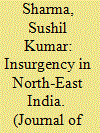

|
|
|
|
|
| Publication |
2014.
|
| Summary/Abstract |
State and non-state elements in India's neighbourhood have beensupporting insurgency in the North-East to weaken the Indian state. Inthe 1960s and 1970s, insurgents from the region, particularly the Nagarebels, had received moral and material support from China. Moreover,elements in Pakistan and Bangladesh too have been aiding North-EastIndian insurgents from time to time. The sanctuaries in Bhutan andMyanmar have emerged out of the inability of their governments toadequately administer the border areas or deal effectively with the hostileactivities of the Indian insurgents inside their respective territories. Thisarticle examines the role played by various external powers in sustain inginsurgency in the North-East, the changing external dynamics, andprovides a road map for future.
|
|
|
|
|
|
|
|
|
|
|
|
|
|
|
|
| 4 |
ID:
132213
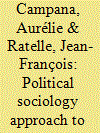

|
|
|
|
|
| Publication |
2014.
|
| Summary/Abstract |
This article seeks to foster a better understanding of the diffusion of conflict in the North Caucasus. We argue that diffusion of conflict is a dynamic and adaptive process in which outcomes are shaped by the intersection of three social mechanisms-attribution of similarity, brokerage, and outbidding-and the political, social, and religious contexts. We suggest that a distinction should be made between horizontal and vertical processes of diffusion. We also approach the empirical diffusion of conflict from a different perspective, showing that non-Chechen actors have played a key role in both the diffusion process and its outcomes.
|
|
|
|
|
|
|
|
|
|
|
|
|
|
|
|
| 5 |
ID:
131640
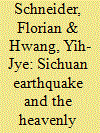

|
|
|
|
|
| Publication |
2014.
|
| Summary/Abstract |
In the aftermath of the 2008 Sichuan earthquake, the Chinese authorities launched a major public relations campaign to relay positive images of their relief effort and strengthen their political legitimacy. The effect has been a proliferation of symbols and political statements related to the disaster, not only in the official media, but also in cultural products such as movies or mass-media events. The earthquake has become part of the discourse of suffering, struggle, solidarity and ultimately victory. This article examines the ways in which various cultural products present the Sichuan earthquake and asks what meanings national crises have in the Chinese discourse on political legitimacy. The article analyses two cases: Chinese film, here in the form of Feng Xiaogang's blockbuster Aftershock, and performance-based discourses during the Beijing Olympics, the PRC's 60-Year Anniversary and the Shanghai Expo. By conducting a discourse analysis, we show how the earthquake has become part of a recurring discursive formation that is used by state and non-state actors alike to legitimate China's developmental model. Within this discourse, the leadership of the Party, the mastery of free markets and a revamped version of the Confucian idea of benevolent rule are marshaled as the decisive factors for winning any 'battle'.
|
|
|
|
|
|
|
|
|
|
|
|
|
|
|
|
| 6 |
ID:
131813
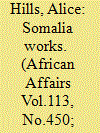

|
|
|
|
|
| Publication |
2014.
|
| Summary/Abstract |
Somalia is an exceptionally insecure state that nevertheless offers an arena in which police officers and institutions can - and do - function. This article argues that Somalia's three regional police forces offer insight into the dynamics that result when locally driven institution-building projects interface with international state-building projects. The resultant picture is nuanced because police negotiate with private actors even as they develop their state-based authority, and their achievements are limited by Somali power brokers sharing a political understanding of security provision, valuing external assistance as a business opportunity, and adapting international models of governance accordingly. Consequently, while the prospects for institution building are favourable, stabilization is unlikely to shift into state building or development.
|
|
|
|
|
|
|
|
|
|
|
|
|
|
|
|
| 7 |
ID:
132480
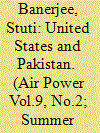

|
|
|
|
|
| Publication |
2014.
|
| Summary/Abstract |
Political instability, economic Volatility, the rise of the right-wing political leadership and an increase in the number of terrorist organisations operating from Pakistan and gaining the support of the Pakistani establishment have nations concerned about the safety of the nuclear assets within Pakistan. Adding to the problem is the well documented proliferation network that has supplied nuclear technology to North Korea, Libya and Iran, with Pakistan, at its centre. These actions have increased the problems and challenges that nuclear proliferation poses. The proliferation of nuclear weapons technology, associated technology and/ or nuclear material to any state or non-state actor, not recognised to receive such technology or material, is one of the most serious dangers to the international security environment. This contributes to not just regional instability and global proliferation, but also increases the risk of violent non-state groups obtaining a nuclear weapon, with a number of violent extremist groups opposed to
India operating from Pakistan. These issues have raised concerns among the international community about the security of Pakistani nuclear weapons. For the United States, Pakistan poses a serious dilemma. Pakistan has been an 'ally' of the United States during the Cold War and continues.
|
|
|
|
|
|
|
|
|
|
|
|
|
|
|
|
|
|
|
|
|